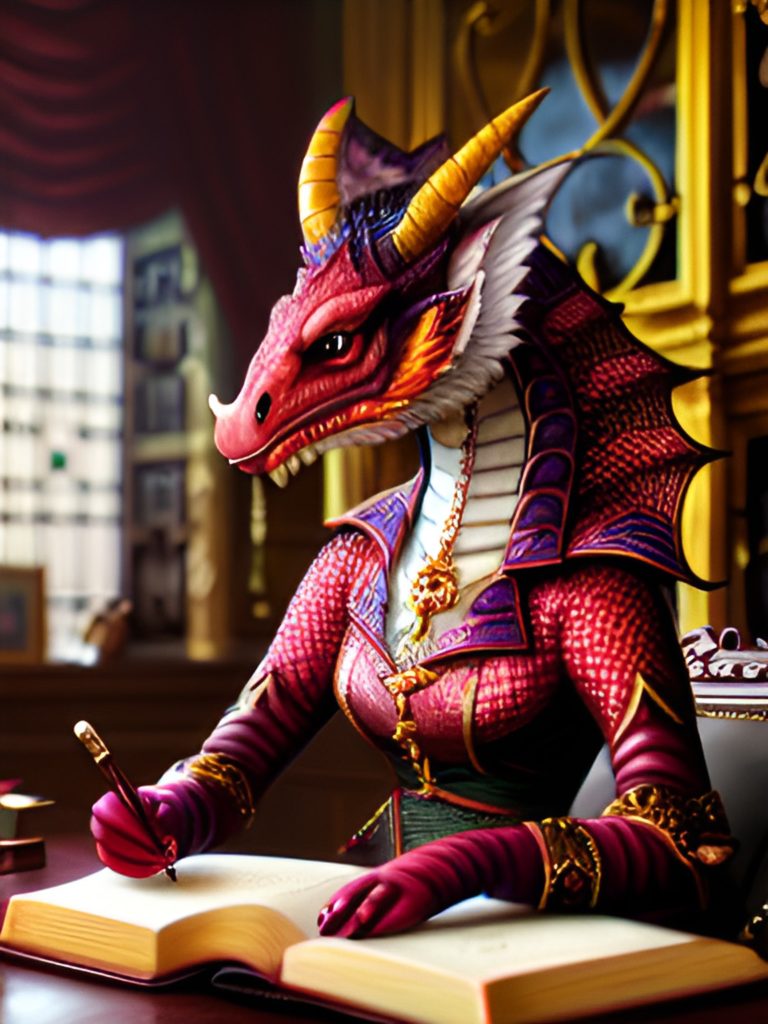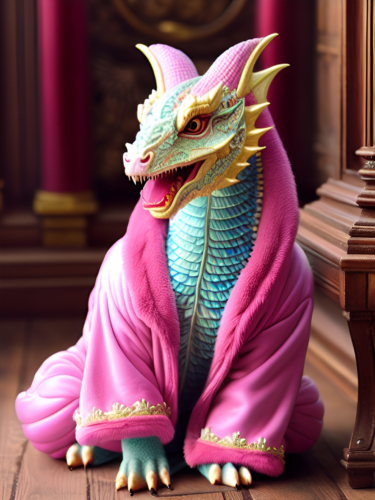
Generally, I like to keep all things author-ly light and fun. Way back in the dark ages, high school English felt rather traumatic, and very, very dark (Thomas Hardy, I’m looking squarely at you!) I don’t pretend to any great literary aspiration, but I do love story nearly as much as I love sociology and the study of culture. Occasionally, someone asks me to speak about the more scholarly aspects of writing and Austen, like the Jane Austen Summer Program did this year. So, I shed my fuzzy pink bathrobe and adorn myself in grown-up clothes to address more serious matters.
More or less.
(I can embrace grown-up clothes well enough, but, never fear, I am not about to go Hardy-esque on anyone!)
Dragon Voices in Jane Austen’s World
The question of whether or not dragons belong in Austen’s world comes up with great regularity in my world. Not the question I ever expected to be frequently asked at this stage of my life, but alas, there it is. As such, I’ve delt with the topic pretty thoroughly HERE and HERE. If I do say so myelf, I think I’ve pretty well established that dragons do indeed belong in Jane Austen’s world.
What I have not talked about, though, is what these dragon voices have to say about Jane Austen’s world. In short, the answer is quite a lot, and not what you might expect.
Here’s where it gets a little more highfalutin than I usually prefer to sound. But I hope you’ll indulge me for a few minutes. (If not, then just pat me on the head, muttering ‘there, there dear writer…’ and scroll down to cute dragon in a bathrobe.)
It is easy to forget that Austen ‘s world is almost as unlike our own as Tolken’s world of Lord of the Rings. That seems rather a bold statement considering we can board some modern marvel of transport and visit the actual places she knew. Those experiences make Austen’s Regency world seem very real and immediate for us.
However, when we visit those places, we are visiting them in a modern context. She knew these places in their historical context, with all the subtle nuances and unconscious understandings that go with that. These are elements almost entirely invisible to the modern visitor. Without that lived context, we are limited in how much we can understand of the world she existed in.
History is an Alien World
We assume we understand things and impose that often-faulty understanding on what we read in Austen’s works. The workings of dowries, marriage articles, betrothals, weddings and the dreaded ‘compromise’ are frequently misunderstood, leaving the reader to misunderstand or miss entirely points in Austen’s text that would have been obvious to her contemporaries, the people that she wrote for. Women’s legal personhood was shaped by the legal principle of ‘coverture’, subsuming her personhood into that of her husband at marriage. Modern readers rarely understand what this meant for women of Austen’s day, though her intended audience did. (If you want to know more, check out Courtship and Marriage in Jane Austen’s World)
The list goes on and on, from the presence of servants, the realities of travel, medicine, food (Ice cream alone had a completely different context as a display of wealth, to which I devoted an entire book), clothing—it is difficult to know where to stop. The world of Austen is as foreign to us as any fantasy world.
And that’s where the dragons come in.
As blatantly fantasy creatures, the dragons say and do things to direct a reader’s attention to elements they might not understand from Austen’s world, and provide explanations the reader might not even know they need.
“Darcy, you’re an idiot.”
For example, dragons can provide an opportunity for characters explain their motivations to dragons who, like the reader may not understand the human character’s world. Walker and April (Darcy’s and Elizabeth’s Dragon Friends) regularly question the decisions and behaviors of their Friends, allowing explanations that fit the narrative context, while providing the reader extra context with which to understand the Regency Era world. Tiny fairy dragon April observes high ranked women of London’s ton and judges their behavior much as a modern reader might, allowing Elizabeth to explain the situation to her little Friend. Walker openly criticizes Dary’s behavior at times, often at those time modern readers feel frustrated with him, forcing Darcy to defend himself to those readers.
The dragons also provide a means to illustrate concepts like social rank and dominance that are foreign to the modern reader. Today, readers have little familiarity with the intricacies of formal etiquette and what might be at stake when those rules are violated. Events like the Dragon Keeper’s Cotillion provide an opportunity to explore those ideas as the characters struggle to learn dragon etiquette not unlike what young people would have been expected to learn for presentation at court.
On an even larger scale, dragons also afford the opportunity to explore social issues, like the challenges facing women in positions of authority. Men and women alike struggle with leading Dragons’ tendency to assign women to places of authority. The series has only just begun to explore the ripples caused by the dragons naming Elizabeth ‘Dragon Sage’, a position of unclear power and authority, but a very clear a dominance above many men. Similarly, the tension and conflict between major and minor dragons parallels the struggles faced between landed and the unlanded classes. A conflict with a great deal of complexity and no clear and easy answers.
I could go one and on, considering that with the latest book, the series now exceeds one million words. I think you get the gist, though, and can agree with me, not only do Jane Austen’s dragons have a great deal to say, but they play a large role in bringing the historical world of Jane Austen to life.
What do you think dragons have to day about Austen’s world?
As promised, a dragon in a fluffy pink bathrobe. 😉


6 comments
Skip to comment form
First, I’d like to thank you for this post, Maria. I read it earlier and mulled over the content, knowing I had things in my head I wanted to say but not sure how to express them. And I wanted to read the latest book before I said anything. Thank you again.
I really appreciated your revealing the way dragons questioning the human characters gave you the ability to instruct the reader on Regency history. That was fabulous. I discovered JAFF and Regency fiction at the same time and have read lots of both. The more I learn about Jane Austen’s time and the Regency in general (I really discovered this years ago) I realized that so many authors assume they know a rule or propriety or habit based on what they themselves have read, which was handed down incorrectly to those authors in the first place. No earth shattering news there, but in support of your task of setting things straight in a delightfully painless and enchanting way. Whether the lessons stick with the reader or not, so that they might recognize an anachronism when they read one is probably water under the bridge at this point. I love so many authors of JAFF that I will read many faves going in knowing that I’m in for modern language and modern sensibilities galore. But I Know It When I Read It. And those also are usually of a humorous bent.
Because I read this article, after reading the newest book I stepped back before reviewing and thinking about it with this in mind. This early in the book’s launch–Here There Be Dragons–I hesitate to say too much. But I’m bursting with what I think are clues. And seeing things in scenes that have real world counterparts, beyond the most obvious ones. Women’s legal and social rights, for example. There were so many frustrating situations involving this issue in the book. I wanted to throttle several characters!
The modern political counterparts to the situation with the sea dragon’s non-relationship with the Blue Order, and the Order’s ignoring the needs and contributions of the minor dragons was very obvious to me.
Your development of Anne’s character is arguably the best part of this latest book. Wentworth is becoming as much a leader on land as he was at sea. And I know the next book must put these two through more character building challenges which I’m sooo looking forward to. But with Anne’s journey to see Lady Russell/Viola, perhaps only from my own experience, I saw how difficult it was to go through the motions of trying to honor a mother figure in her last hours of illness, and not knowing what exactly to feel. Especially since there was no resolving of old wrongs. I was overwhelmed.
Lastly. I was one of the skeptics that thought dragons in Austen’s world just sounded too off off canon for me. Then you published your third book and I decided that since I loved your writing, what could I actually lose? The first three books were on sale, I snatched them up and I cannot imagine going back. I’m not a fantasy reader in general. But I am so hooked. I love reading your articles supporting the existence of dragons, but for me they only add to my enjoyment of the world you’ve created in Your Dragon World, Maria. I in NO way believe that 12 books is even close to be enough stories to bring the development of the arc of the series to a close, but I’m thinking ahead now. Probably because of that cliff hanger you left us with with your newest.
Author
Thank you so much for taking a chance on the dragon world and joining me on this crazy journey. I have been amazed at how the world has developed and the directions it has gone. Who would have thought the dragons had so many serious things to say?
I really like how the dragons ask questions that many times I have thought. I am enjoying the series and love the cute dragon in the pink bathrobe.
Author
Thank you. I love the dragon in the bathrobe too!
I love your point about history as an alien world, and I’ve always been grateful for the research you’ve shared about the Regency era. Thank you, Maria Grace!
Author
Thank you, Christina!